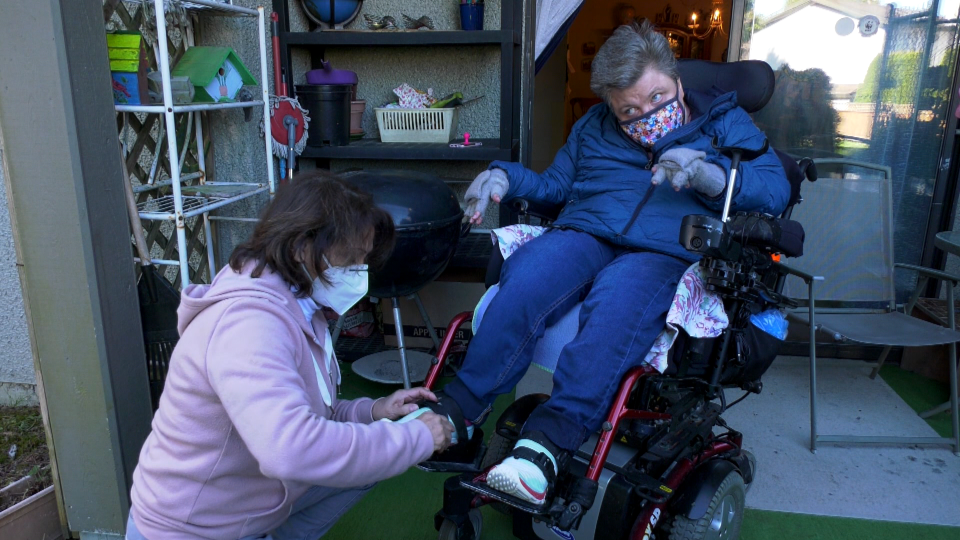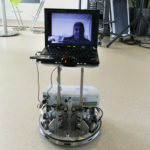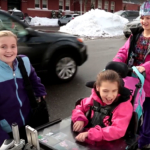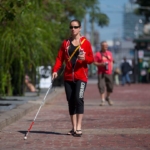Older adults with Cerebral palsy need more, receive less physical therapy for painful medical conditions
The findings reveal a significant burden on a clinically underserved population.

Surrey, B.C., resident Jenny Taylor, 55, says one of her caregivers (not pictured) recently abandoned her and left her in a vulnerable position for hours. Michele Brunoro, CTV News
Noah Fromson, University of Michigan Health Lab May 27, 2021
Adults with cerebral palsy are more likely to experience the debilitating pains of musculoskeletal disorders, but they receive significantly less physical therapy for those ailments, according to a recent study.
The findings, published in Disability & Health, analyzed four years of Medicare service claims from community-living older adults with and without cerebral palsy who had one or more ambulatory claims for a musculoskeletal diagnosis. Fewer than one-third of general population patients utilized physical therapy. Those with cerebral palsy, despite having greater risk of secondary comorbid conditions, received even less physical therapy.
“The results are staggering, but they support our hypothesis that people with cerebral palsy receive inequitable health care,” says Mark Peterson PhD, the Charles E. Lytle, Jr. Research Professor of physical medicine and rehabilitation at Michigan Medicine and co-author of the paper. “We know adults with cerebral palsy have musculoskeletal conditions that are far worse than the general population. They need more, but they’re getting much less in terms of treatment.”
A neurodevelopmental condition caused by a range of abnormalities in the brain, cerebral palsy is the most common childhood-onset motor disability. The research team says the findings underscore the need for increased clinical awareness of musculoskeletal conditions for older adults with cerebral palsy, as well as improved screening strategies and preventative health interventions.
Cerebral palsy is often seen solely as a pediatric condition, Peterson says, which is part of the reason the adult population is misunderstood and not properly treated.
“Children with cerebral palsy grow up, and the general population of medical providers need to be more aware that adults with cerebral palsy are at high risk for these musculoskeletal disorders,” he says. “Secondly, adults with cerebral palsy need more access to specialists for treatment. They ‘age out’ of specialty hospitals, and adult rehabilitation service providers don’t necessarily have the knowledge to ensure these patients receive high-value care.”
| Disclosures: This work was supported by a grant from the Foundation of Physical Therapy, Multi-Institutional Center of Health Services Training and Research (CoHSTAR). The findings do not necessarily represent the official position of CoHSTAR. |
 Source University of Michigan Health Lab
Source University of Michigan Health Lab
| References |
Musculoskeletal diagnoses, comorbidities, and physical and occupational therapy use among older adults with and without cerebral palsy, Thorpe D, Gannotti M, Peterson MD, Wang CH, Freburger J. Disabil Health J. 2021 Apr 15:101109. doi: 10.1016/j.dhjo.2021.101109. Epub ahead of print.
| Further reading |
Age trajectories of musculoskeletal morbidities in adults with cerebral palsy, Whitney DG, Hurvitz EA, Devlin MJ, Caird MS, French ZP, Ellenberg EC, Peterson MD. Bone. 2018 Sep;114:285-291. doi: 10.1016/j.bone.2018.07.002. Epub 2018 Jul 5.
Allocation of Rehabilitation Services for Older Adults in the Ontario Home Care System, Armstrong JJ, Sims-Gould J, Stolee P. Physiother Can. 2016;68(4):346-354. doi: 10.3138/ptc.2014-66. Full text
Rehabilitation therapies for older clients of the Ontario home care system: regional variation and client-level predictors of service provision, Armstrong JJ, Zhu M, Hirdes JP, Stolee P. Disabil Rehabil. 2015;37(7):625-31. doi: 10.3109/09638288.2014.935494. Epub 2014 Jul 1.
A comparison of home care quality indicator rates in two Canadian provinces, Mofina AM, Guthrie DM. BMC Health Serv Res. 2014 Jan 25;14:37. doi: 10.1186/1472-6963-14-37. Full text
Cerebral palsy and aging, Haak P, Lenski M, Hidecker MJ, Li M, Paneth N. Dev Med Child Neurol. 2009 Oct;51 Suppl 4(0 4):16-23. doi: 10.1111/j.1469-8749.2009.03428.x. Full text, PDF
Also see
Cerebral Palsy and Functional Decline Cerebral Palsy Research Network
Abandoned by care worker, Surrey woman with cerebral palsy uses technology to summon help CTV News
Bernadette Rivard lived 83 years with cerebral palsy CBC News Sudbury
Does Cerebral Palsy Get Worse With Age? CP Family Network






